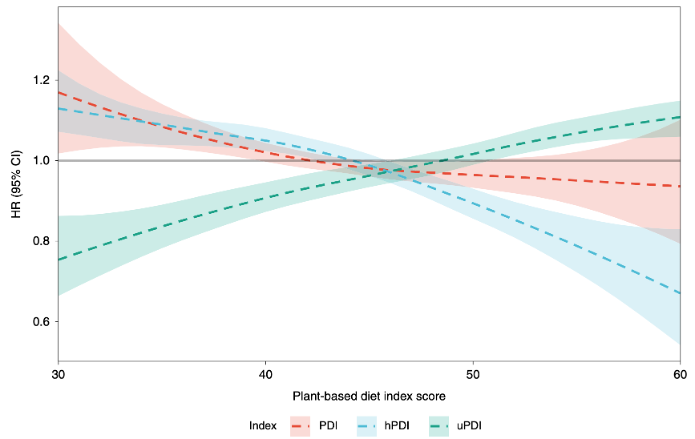Key Points:
- Older adults with unhealthy plant-based diets have an increased risk of mortality, while older adults with healthy plant-based diets have lower risks.
- Fresh fruits and vegetables, legumes, garlic, nuts, and tea are associated with a lower risk of mortality.
- Preserved vegetables — such as those pickled with salt and brine — and sugar are associated with a higher risk of mortality.
Many of today’s foods are expertly engineered to hack the senses and taste perfect to the palate. It’s no secret that these processed foods are counter to a healthy diet, but what defines a healthy diet? If you were to say a plant-based diet, when it comes to longevity, you wouldn’t be completely wrong. In a new study from Zhejiang University in China, published in Nature Aging, Chen and colleagues report that while a diet mainly consisting of plant-based foods decreases the risk of mortality, specific types of plant-based foods can decrease the risk of mortality further. On the other hand, eating the wrong types of plant-based foods can increase the risk of mortality.
The Harms of an Unhealthy Plant-Based Diet
Older adults over the age of 65 from the Chinese Longitudinal Healthy Longevity Survey (CLHLS) study filled out dietary intake questionnaires every three to four years for six years. Participants who ate more plant-based foods than animal foods (animal fat, meat, fish, dairy products) tended to be male, better educated, and exercised regularly. After a 10-year follow-up, about 68% of participants passed away, allowing Chen colleagues to determine mortality risk based on dietary intake.
After adjusting for demographic and lifestyle factors, mortality risk was found to be lower in participants who ate more plant-based foods than animal foods. Mortality risk was further reduced in participants who ate more healthy plant-based foods than unhealthy plant-based foods. In contrast, mortality risk was increased by 17% for participants who ate more unhealthy plant-based foods than healthy plant-based foods.
The healthy plant-based foods associated with a lower risk of mortality were fresh fruits and vegetables, legumes, garlic, nuts, and tea, while the unhealthy plant-based foods associated with a higher risk of mortality were preserved vegetables and sugar, demonstrating that not all plant-based foods are equal.

Diet Matters
Diet is among the top five risk factors for death worldwide and the food we choose to eat determines our risk for multiple diseases. A plant-based diet – eating more plants than animals and animal products – has been shown to have many health-related benefits, including reducing the risk of mortality. However, if the wrong plant-based foods are chosen, these benefits can become harms. Beneficial plant-based foods include whole grains, fruits, vegetables, nuts, legumes, and tea while potentially harmful plant-based foods include refined grains, preserved vegetables, and sugar. A harmful plant-based diet is associated with a higher risk for diseases like hypertension, type 2 diabetes, and cardiovascular disease. However, the relationship between plant-based dietary patterns and mortality is not fully understood.
“Diet is closely related to human health. We hope that our research will provide evidence for future dietary recommendations, and we plan to further assess the benefits for health and environment brought about by gradually adopting a healthful plant-based dietary pattern,” say the senior investigators, Dr. Yuan and Dr. Wang.
Promoting a Healthier Nation
The findings of Chen and colleagues support the idea that a plant-based diet is only beneficial when done right. That is, without overly processed foods containing excessive sugars. A similar study done in the United States essentially had the same results showing that a healthy plant-based diet is associated with a lower risk of all-cause and cardiovascular disease mortality, while increased consumption of unhealthy plant-based foods is associated with a higher risk of total and cardiovascular disease mortality. In general, a plant-based diet is associated with lowered mortality risk, but these studies take it a step further to demonstrate that plant-based diets that contain too much sugar and sodium can also be unhealthy.
The authors write, “our study could act as evidence for future nutrition policies promoting systematical and synergistical transformation to a better food system.” This sort of change in policy may be easier to enact in China than in Western countries, especially the United States where policy changes concerning the regulation and marketing of processed foods seem to be tied up with the interest of large corporations.
“What made this study stand out was the focus on China because the dietary cultures there are different than in the West where most of those studies are conducted. We also valued the very large sample size (>13,000 individuals), the advanced age of entry in the study (65+) and the clear public health and policy implications for one of the largest and most rapidly aging nations in the world.” Sebastien Thuault, Chief Editor, Nature Aging
It seems unlikely that processed foods will be outlawed any time soon, but in the meantime we can make informed decisions about our food choices. Whether we primarily consume plant-based foods or not, it would probably be a good idea to stay away from preserved vegetables and sugar as much as possible.